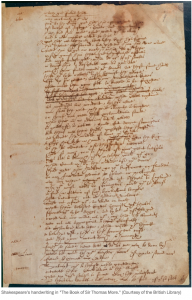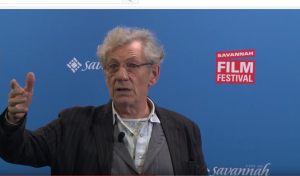Righteous Words from Shakespeare, So Pertinent to Today’s Refugee Crisis—Read by Sir Ian McKellen
![]()
In what appears to have been November 2010, at the Savannah Film Festival, Sir Ian McKellen had occasion to read lines of Shakespeare from a play called “The Book of Sir Thomas More,” words set in the voice of More, a councillor to King Henry VIII. Shakespeare didn’t write the original, but contributed to rewriting portions of the drama with other contributors some 400 years ago. It is not a well-known work, and McKellen says here that it may have never been performed for an audience until 1964. This 5-minute youtube clip is linchpin of a good Washington Post article published today by reporter Karla Adam, the headline for which opens this post, pretty well summing up the message of the words read by Sir Ian.
Adam also reports that the text of the passage, in Shakespeare’s own handwriting, has recently been digitized by the British Museum, and is featured in a new exhibit at the Folger Library in Washington, DC. McKellen explains that earlier, a year before his appearance at the Savannah Film Festival, in London at Trafalgar Square, or St Martin-in-the-Fields, as it would’ve been known in Shakespeare’s time, a man and his gay partner were set up on three hooligans, who killed him. The location is also where in the play More gives this speech. Below is a still from the very powerful video, and click here for the video itself. You may want to first read the Washington Post article for full context as I had done before I watched it.
I’ll add a New York City note to this post, about “a celebrity sighting.” Though they don’t occur all that often here, that’s what I dub them. On two occasions my wife and son and I have had occasion to meet and speak with Sir Ian McKellen. He is approachable, down-to-earth, and charming. The first time was in 2003, soon after “The Fellowship of the Ring,” the first of Peter Jackson’s Tolkien movies, had premiered. The three of us had just seen the movie a few days before, and we bumped in to him at the old Weber’s Odd-Lot discount store near W 72nd St and Broadway. He was in town doing a Strindberg play on Broadway with Dame Helen Mirren. With my son Ewan, then about seven years old, we found ourselves behind him in line, while my wife was elsewhere in the store for a moment. The wait in line was long enough for me to spot him, nudge my son, and whisper who was in front of us. I leaned in a bit toward the gentleman and without invading his space, said something like, “Sir Ian, congratulations on all the great roles you have this season.” Turning toward us with a warm smile we began conversing. I mentioned we’d only a couple days earlier seen the movie and had found it breathtaking. I added, “We miss Gandalf,” thinking of the fall in to the abyss he’d suffered fighting the Balrog. Sir Ian adopted the deep voice of the Grey Wizard, and addressing Ewan especially, he intoned reassuringly, “He’ll be changed, but he’ll be back. He’ll be changed, but he’ll be back.”
The other time was a few years later, at BAM where the three of us had just seen him perform as King Lear. We waited afterward at the stage door and came out to greet the handful of fans clustered there. He spoke to each group for a few minutes, for a warm and friendly chat. He is a good and decent man, and his humanity shines through in this remarkably fluent rendering of Shakespeare words about refugees, or “strangers” as they’re called here.

